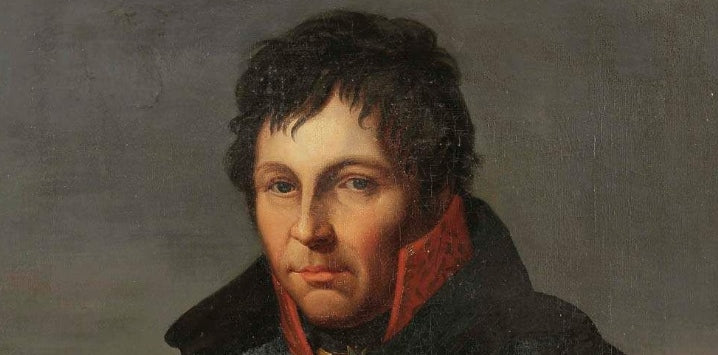Part nine of our series highlighting the careers of ten of the greatest generals of the Napoleonic Wars looks at General Gerhard von Scharnhorst, not only one of the best staff officers of the age, but a military theoretician and army reformer who transformed the Prussian Army and paved the way for Prussia's success in the 'War of German Liberation' of 1813.
Gerhard von Scharnhorst (1755-1813)
Gerhard von Scharnhorst was born in Bordenau near Hanover in 1755 to a family of modest means. In 1773 he secured admission to the military academy in the Wilhelmstein fortress (situated in the middle of a Lake Steinhude 20 miles from Hanover) under the instruction of Wilhelm, Graf zu Schaumburg-Lippe, a distinguished military commander and theorist and the grandson of King George I of England. Schaumburg-Lippe ideas, such as "only defensive wars are justified" and "the goal of studying war as science is to minimize future warfare" had a great impact on the young Scharnhorst.
In 1778 he joined the Hanoverian army and was transferred to the artillery in 1783. During this period he established a reputation as a military theoretician and wrote extensively on the subject. His first experience in the field came in 1793 when he served under the Duke of York in the Flanders Campaign.
Prince Frederick, the Duke of York, was the second son of King George III of Great Britain, who was concurrently Elector of Hanover. The Duke of York’s campaign proved to be ineffectual and was widely mocked at home. It is said to have become the inspiration for the English nursery rhyme which begins “The Grand Old Duke of York, he had ten thousand men. He marched them up to the top of the hill and he marched them down again.” Nevertheless, Scharnhorst distinguished himself in the defence of Menin and was promoted to chief of staff of the Hanoverian Army.
During this period Hanover encountered considerable political turmoil, having been occupied by the French Revolutionary armies and later exchanged with Prussia. Scharnhorst's efforts to reform the aristocratic Hanoverian army by introducing a meritocratic officer corps encountered considerable opposition, and in 1801 he was glad to accept an offer to transfer to the Prussian Army. He taught at the newly-founded war academy in Berlin, where Carl von Clausewitz was among his pupils. Scharnhorst recognised that the Prussian army had to be reformed in order to fight more effectively against the French Revolutionary armies. Unfortunately the high command remained committed to Frederick the Great’s system which had served them well for more than half a century.
Scharnhorst participated in the disastrous 1806 campaign against Napoleon as Chief of Staff to the Duke of Brunswick, the commander-in-chief of the Prussian Army. Defeats at Jena and Auerstedt (where Brunswick was killed) on 23 October 1806 and the disorganised retreat shattered the reputation of Frederick the Great’s system overnight. Attaching himself to Gebhard von Blücher, Scharnhorst did what he could to gather up the remnants of the Prussian Army. He was briefly a prisoner of the French but was released in a prisoner exchange and fought with the Russians at Eylau, before Russia’s defeat at Friedland in June 1807 led to the Peace of Tilsit.
Following Tilsit, King Frederick William III appointed Scharnhorst to chair a commission to reform the Prussian Army. Other members of the commission included Hermann von Boyen, August Neidhardt von Gneisenau, and Carl von Clausewitz, all of whom would go on achieve their own fame as staff officers and military theorists.
The terms of the Treaty of Tilsit were extremely punitive towards Prussia, and limited the size of the Prussian Army (previously at 230,000) to a mere 42,000 men. In order to circumvent the restriction Scharnhorst developed a innovative system whereby men would serve for a short time in the standing army before being placed on the reserve list after completing their training. Other elements of Scharnhorst’s reform included a new professional officer corps, greater emphasis on light infantry, combined arms units, relaxed discipline and the creation of a militia (the Landwehr) operating in parallel with the main army.
In February 1813 Prussia signed the Treaty of Kalisz with Russia and joined the Sixth Coalition against Napoleon. Scharnhorst’s reforms allowed the Prussians to mobilise an army of over 100,000 men very rapidly. When the army took to the field, Scharnhorst chose to serve as Blücher’s chief of staff, recognising that the veteran general’s ability to inspire his men would be crucial to the forthcoming campaign. When von Boyen cited Blücher's history of mental illness, including delusions of being impregnated with an elephant, Scharnhorst is supposed to have said "He may have a thousand elephants in his belly, but he must lead the army!"
Before the Battle of Lützen on 2 May 1813, the Russian commander (and allied commander-in-chief) Count Pyotr Wittgenstein was so impressed by Scharnhorst's staff work that he asked Blücher to borrow him as his chief-of-staff. During the battle Scharnhorst received a slight wound to the foot. The wound forced him to leave the army, but did not prevent him from travelling to Prague to negotiate with Prince Schwarzenberg and his Chief of Staff Jozef Radetzky over Austria’s entry into the Sixth Coalition. It is claimed that during these meetings Scharnhorst suggested a plan to defeat Napoleon which would involve the allied armies retreating from Napoleon himself, but seeking battle with his marshals. This was later adopted in August as the Trachenberg Plan.
However, Scharnhorst would not live to see Austria's entry into the Sixth Coalition, nor the Allied victory at the Battle of Leipzig in October 1813, which liberated Germany from Napoleonic rule. The wound he had suffered at Lützen was not treated properly and became infected, resulting in his death at the age of 57 on 28 June 1813.
Check out our 'Scharnhoot' mug!

Or perhaps you prefer a T-shirt?




Share and get 15% off!
Simply share this product on one of the following social networks and you will unlock 15% off!